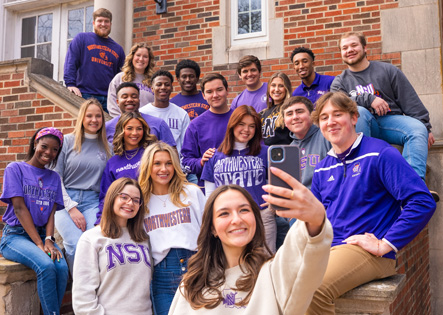Make college affordable—without the stress. At Northwestern State University (NSU), we help you unlock gift aid you don’t have to repay, so you can focus on classes, career readiness, and joining a vibrant community—not how you’ll pay for it. Explore these federal and state grants to lower your costs and fast-track your goals.
Federal Grants
Federal Pell Grant Program
The Federal Pell Grant is gift aid that does not have to be repaid. It’s awarded to undergraduate students and often forms the foundation of a student’s financial aid package, with other federal and non-federal aid stacking on top to reduce your out-of-pocket cost.
Your award depends on: your Student Aid Index (SAI) on your FAFSA Submission Summary and the number of hours in which you enroll. If you’re eligible, the university will credit your student account automatically.
Lifelong limit: Effective July 1, 2012, you can receive Pell for no more than 12 semesters (roughly six years). You’ll be notified if you’re approaching your limit.
Questions? Learn more here: Federal Pell Grant (studentaid.gov).
Federal Supplemental Educational Opportunity Grant (SEOG)
The SEOG provides additional grant funds for undergraduates with financial need. Funding is limited and depends on the amount the university receives from the federal government. Eligible students are automatically considered—no separate application required.
Federal Teacher Education Assistance for College and Higher Education (TEACH) Grant
The TEACH Grant provides up to $4,000 per year (graduate students are also eligible for up to $4,000 per year, maximum $8,000) for students who intend to teach full-time in high-need subject areas at Title I (low-income-serving) elementary or secondary schools in the U.S. Award amounts are based on enrolled hours.
Apply now (PDF):
2025–2026 TEACH Grant Application
Because TEACH is a federal program, we encourage you to review official details here: TEACH Grant Program Information (studentaid.gov).
Who can get it at NSU? Students pursuing a degree leading to teacher certification who have been admitted to teacher candidacy in the College of Education.
Important: If you do not complete the four-year teaching obligation (see “Teaching Obligation” below), your grant will be converted to a loan and you will need to repay it with interest.
Effective Dates: The first TEACH Grants were awarded for the 2009–2010 academic year.
Notice (Budget Control Act of 2011): All TEACH Grant awards with a first disbursement after March 1, 2013 require a reduction mandated by the BCA of 2011.
General Program Requirements: Please carefully review the TEACH Grant fact sheet before applying:
Student Eligibility Requirements (NSU):
- Complete the FAFSA (financial need not required for TEACH).
- Be a U.S. citizen or eligible non-citizen.
- Complete the NSU TEACH Grant Request Form for each year you request TEACH funding.
- 2022–2023 TEACH GRANT Application (legacy reference).
- Maintain a cumulative GPA of at least 3.25 on a 4.0 scale (and continue to maintain at least 3.25 while receiving the grant).
- Be admitted to the College of Education teacher candidacy program.
- Complete TEACH Grant counseling with the U.S. Department of Education: TEACH Grant counseling
- Sign a TEACH Grant Agreement to Serve and Promise to Pay each year (available electronically): TEACH GRANT Agreement to Service
TEACH Grant Agreement to Serve & Promise to Pay: Each year you receive a TEACH Grant, you must sign this service agreement acknowledging that if you don’t meet the teaching requirements, the grant converts to a Federal Direct Unsubsidized Loan (interest accrues from the original disbursement date).
TEACH Exit Counseling: If you graduate or stop attending your TEACH-eligible program, you must complete TEACH Exit Counseling within 30 days of your last date of attendance: TEACH Exit Counseling
Teaching Obligation (to avoid conversion to a loan): Serve as a highly-qualified, full-time teacher in a high-need subject area for at least four years within eight years of finishing your program, at a school serving low-income students.
Highly-Qualified Teacher: Defined in section 9101(23) of the Elementary and Secondary Education Act of 1965 or section 602(10) of the Individuals with Disabilities Education Act. See “Highly Qualified Teachers” Revised State Plans (Louisiana): http://www.ed.gov/programs/teacherqual/hqtplans/index.html#la
Full-Time Teacher: Meets the state’s definition of full-time and spends at least 51% of time teaching a high-need subject.
High-Need Subjects include:
- Bilingual Education and English Language Acquisition
- Foreign Language
- Mathematics
- Reading Specialist
- Science
- Special Education
- Teacher shortage areas identified at the time you begin teaching (see the U.S. Department of Education’s annual list): Teacher Shortage Areas
Schools Serving Low-Income Students: Any elementary or secondary school listed in the Teacher Cancellation Low Income (TCLI) Directory: TCLI Directory (studentaid.gov)
Documentation: For each TEACH-eligible program in which you received TEACH funds, you must provide documentation (certified by the school’s chief administrative officer) after completing your four academic years of teaching that you served as a full-time, highly-qualified teacher at a school serving low-income students, in a high-need subject area.
Within 120 days of completing or ceasing enrollment, you must also confirm to the U.S. Department of Education that you are fulfilling or plan to fulfill the service agreement terms. More info: TEACH Grant (studentaid.gov)
Important Reminder: Failure to complete or properly document your service will cause the TEACH Grant to be permanently converted to an unsubsidized Federal Direct Stafford Loan with interest accruing from the original disbursement date. In the Federal Register (73 FR 15354, March 21, 2008), the Department of Education projected that ~80% of recipients might ultimately fail to fulfill service requirements, resulting in conversion to loans.
Once converted, a TEACH Grant cannot be converted back to a grant. Please seriously consider the long-term financial impact before accepting the award.
Helpful Planning Tools:
Average Teacher Salaries: https://www.payscale.com/research/US/All_K-12_Teachers/Salary
Loan Payment Calculator: https://www.salliemae.com/college-planning/tools/student-loan-repayment-calculator/
Trouble Paying Loans?: https://studentaid.gov/resources/trouble-paying-text
Iraq and Afghanistan Service Grant
This grant supports students whose parent or guardian died in the line of duty while (a) serving on active duty as a member of the Armed Forces on or after September 11, 2001, or (b) actively serving as and performing the duties of a public safety officer; and who are less than 33 years old as of January 1 prior to the award year (e.g., for the 2024–25 award year, you must be under 33 on January 1, 2024). Students who are not Pell-eligible based on their SAI may receive this grant. The award may not exceed the maximum Federal Pell Grant for that year and is subject to reductions under federal sequestration rules.



